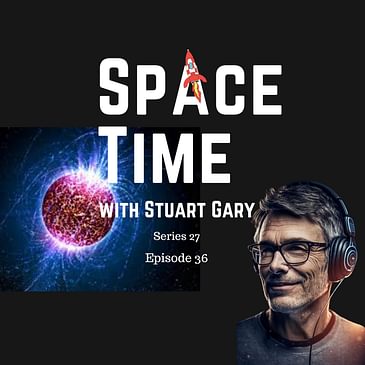SpaceTime Series 27 Episode 36
*The Precise Mass of Neutron Stars Unveiled
Astronomers have pinpointed the exact upper mass limit for non-rotating neutron stars, providing a critical piece to the puzzle of black hole evolution. The study, detailed in Physical Review D, reveals that the heaviest non-rotating neutron stars weigh about 2.25 solar masses. This breakthrough in nuclear physics and astrophysics could refine our understanding of the stellar life cycle and the transition from neutron stars to black holes.
*Japan's Aspirations for Private Spaceflight Go Up in Smoke
Japan's first privately operated space launch provider, Space One, faced a fiery setback as its new solid-fuel rocket exploded seconds after liftoff. The ill-fated Karaos rocket, carrying a government test satellite, disintegrated over the Wakayama region, underscoring the harsh realities of space exploration. The incident highlights the challenges faced by emerging private space companies in the competitive launch market.
*NASA's PACE Satellite Embarks on a Climate Odyssey
NASA's PACE satellite has successfully launched aboard a SpaceX Falcon 9 rocket to begin its mission of monitoring Earth's changing oceans and atmosphere. The $948 million mission will utilize hyperspectral imaging to study the planet's plankton, aerosols, clouds, and ocean ecosystems with unprecedented detail. PACE aims to enhance weather predictions, track climate change, and uncover the intricate balance of our global environment.
*Dark Matter Data Retrieved from the Stratosphere
NASA's mission to map dark matter around galaxy clusters has been salvaged thanks to an innovative data recovery system from the University of Sydney. Despite a rough landing in Argentina that damaged the balloon-based telescope, the system successfully retrieved over 200GB of valuable data. This mission underscores the innovative approaches to overcoming the challenges of high-altitude astronomical research.
Plus, we delve into the story of how climate change is affecting polar bears, the decline in humpback whale populations, and the origins of chocolate as revealed by ancient vessels. And we explore the curious case of the "alien mummies" that turned out to be quite earthly in origin.
For more SpaceTime and show links, visit https://spacetimewithstuartgary.com and access our universal listen link at https://spacetimewithstuartgary.com/listen. Don't forget to support the show at https://www.spreaker.com/podcast/spacetime-with-stuart-gary--2458531/support and follow us for more space and astronomy updates at our HQ at https://bitesz.com.





